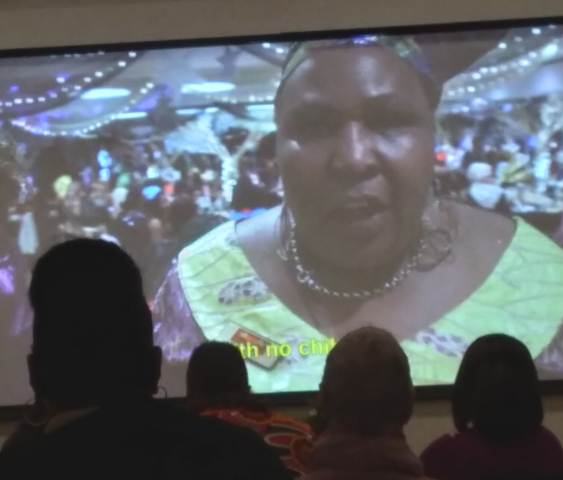By ELIZABETH FRIAS
AUSTRALIA’S Local Hero of the Year, Rosemary Kariuki has urged men and women to “always seek peace in your heart” and called on governments to open more refuges for women, girls and children, escaping domestic violence.
Speaking recently before a large audience at Granville Community Centre for the screening of Rosemary’s Way, a documentary film recounting how she gave hope to migrant women hurt and abused by their husbands or partners, Ms Kariuki said women in violent relationships should “walk away and just don’t come back.”
In the 76-minute film, Ms Kariuki revealed she fled Kenya to save herself from sexual assault and sought refuge in Australia. When she was about to lose her children, Ms Kariuki recalled: “I stayed calm and asked for peace from God my creator.”
The success of the film in raising awareness on how to stop domestic violence happening, including her work as multicultural liaison officer for the NSW Police, was pivotal in Ms Kariuki’s winning the coveted award on Australia Day last January.
Ms Kariuki, 63, also revealed what she asked Prime Minister Scott Morrison when he handed her the award in Canberra.
“When I got the award, I told the Prime Minister we need him to reinstate money for refuge home because women are suffering through domestic violence they cannot get accommodation,” she said.
The audience whistled and clapped loudly.
The screening reunited the women featured in the film shedding light on real forms of abusive relationships and the trauma they have endured in the hands of their former husbands such as Pasca, 34, a single mother of three young boys.
“I have learned that it’s always good to always have hope in your heart,” said Pasca, who lives in Auburn and works at the Sydney office of the United Nations Commission on Human Rights.
Pasca, from Congo, was born with leg impairment thus walking is slow with a limp. She was abandoned in a camp for orphaned children when her parents were fleeing the civil war. She was among thousands of refugees from war-torn Congo brought to safety in Australia.
Can happen to anyone
Maria Baden, a cattle farmer in Gerringong NSW, who volunteered to be host family to Pasca and her boys, all born in Australia, believed “domestic violence is not just confined to refugees” for it happens to anyone.
Mrs Baden said the latest policies on women’s safety and security would solve the violence and result to “big change happening which may not be perfect but we need it to work.”
A community inclusion volunteer worker with the Parramatta Council, Prasanthi Hagare, has been part of the annual African Women’s Dinner Dance that Ms Kariuki organized to encourage women from all cultures in NSW to socialize, connect, and learn from each other.
“I enjoyed the dance since the first time I attended it 14 years ago. It’s quite colourful and you meet many interesting people so I attend every year,” Ms Hagare said.
Bushra Aldarraji, a social worker at Western Sydney schools said she supported Ms Kariuki because providing safe houses for women and children who left troubled homes must be prioritized in every community.
“It doesn’t matter if its big or small funding, any help is good so we can get a house or temporary accommodation for the women and children when they come to us,” Ms Aldarraji said.
“We have to teach our girls to be assertive, too, and I love my job at the schools because I get to help our boys and girls and I am over the moon when I see them doing well and becoming polite,” Mrs Aldarraji said.
The Sydney-based film producer, Pat Fiske said she was confident filming Rosemary’s Way with director, Ros Horin, for it was one of the challenging films she has done presenting domestic violence as a social issue profoundly affecting vulnerable migrant women.
But admitted she is no longer cynical on current policy initiatives on women’s safety and security and educating men on the malaise of coercive control on relationships.
“I think men are starting to understand coercive control that explains how they are controlling in their behaviour that they don’t realise have an impact on women,” said Ms Fiske.
“But I think it’s a start, it’s not enough, but it’s a good start.”
Visit: www.rosemaryswaythefilm.org





